The gods are dead…
– those are the opening words of The Banner Saga. This is a hell of a way to open up a story, but I approve. I’m immediately on board with this. I was expecting a Viking tale about Viking things, but instead I got a post-apocalyptic fantasy, and I couldn’t be more pleased.
Actually, post apocalyptic is probably the wrong word to use it. The world of The Banner Saga is actually in the early stages of apocalypse. But it is not Ragnarock – a great to end all battles that gods wage against the forces of nature. That battle, or a similar one has apparently happened already. But it was not as violent or destructive as one might have expected it. It did not destroy the known universe. In fact, it did not seem to inconvenience the the sentient species of the world. Men and Varl (tall, horned giants who are for all intents and purposes Dwarfs except the diminutive size) simply stood by and watched their makers slaughter each other until none were left.
The faithful of the world still sometimes congregate at, and leave offerings at the gigantic God-stones: huge monuments supposedly built by the gods themselves that used to act as shrines and focal points of their power. But it is more of an old habit than an act of faith. Everyone knows that no one will answer their prayers anymore. When they leave flowers at a God-stone it is akin to leave flowers on a grave: a homage and a sign of respect.
Despite the gods being long gone, their stones do seem to retain a little bit of their former power and majesty. They are safe spaces where no one dares to shed blood, and anyone looking upon the carved visage of the local deity can’t help but feel small and insignificant. But there is more: each stone seems to affect people around it, subtly altering their perceptions and bringing certain thoughts and feelings to the forefront. Is this influence an echo of a former power, a psychological quirk or something else entirely?
When the gods died the mortal men seem to have gotten the better end of the deal, and their race is poised to continue and prosper. The immortal Varl however got screwed. They are asexual and do not reproduce. They were being hand made by their patron God up until he died. Now, the Varl who still live are the last ones to ever exist. Their numbers are dwindling, because even though they do not die of old age they still succumb to diseases and acts of violence.
As the game opens, the sun has stopped in the sky. No one knows why it happened or what it means. There are no prophecies foretelling such an event. In other times, men would have sought the wisdom of the gods for answers. In fact, if the gods were still around they would have probably sent portents, prophecies long before such a world changing event. As it is right now however, men and Varl are on their own. They try to make due and hope for the best, seeing how there is nothing they can possibly do to make the sun moving again.
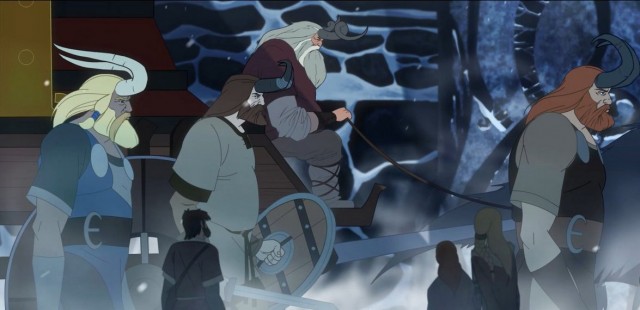
The Varl – a dwindling race of horned, bearded, asexual giants, hand crafted by the gods themselves.
To make matters worse and ancient enemy: the Dredge (who are part darskpawn, part orcs and part stone golems) pour from the North where they were banished centuries ago. Was their magic responsible for freezing the sun? Or were they equally surprised by it? Is this an invasion or a migration? Is the frozen sun affecting the Northen lands differently than the south, thus forcing the Dredge to migrate? No one knows, and it is impossible to ask them because they do not communicate the same way that men and Varl do. The only meaningful communication between the people of the South and the stone-faced creatures of the North seems to involve swords and arrows. Any other attempts at communication from either side else has always been a failure.
This is the setting of The Banner Saga. It is wonderfully weird and strikingly original. I have not expected it to be this good. I’m a sucker for well developed, interesting fictional universes and this is definitely one of them. It mixes familiar accents of Norse mythology with pure fantasy, at the same time avoiding a lot of old and played out tropes. And the setting only gets weirder as you progress and new secrets and mysteries are revealed.
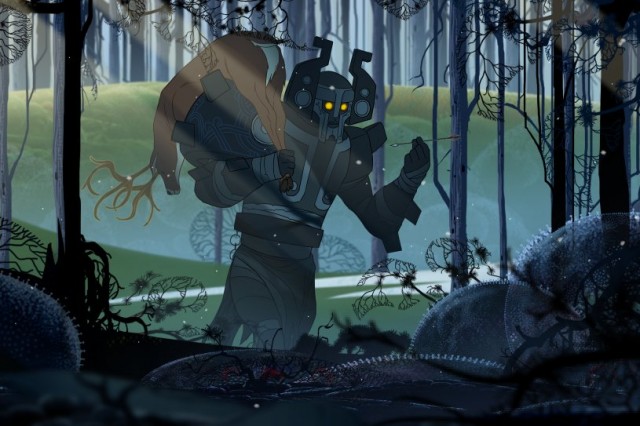
The art for human and Varl characters in the game is really good. The Drege on the other hand… They are kinda goofy sometimes.
You take the role of several POV characters, each of whom is a leader of a small caravan, army or group of refugees somehow affected by the ongoing cataclysm or the Dredge invasion. Your task is to lead your people to safety by both managing the food and resources, negotiating with the locals and occasionally fighting turn based tactical encounters with the enemy.
Mechanically, the game is very, very simple. Most of the plot is communicated via still images and text. There is a bit of voice acting reserved for crucial cut-scenes or set pieces, but it is more of a rare treat. Most of the time you advance the plot via exploring dialog trees, which tend to be rather shallow. Most of the dialog options are purely informative, but some may actually have long lasting consequences. Saying the wrong thing or choosing the wrong action option can lead to permanent death of important characters, loss of resources and erc. What is worse, there is usually no way of telling which options are dangerous, or what their effects might be. In fact, many of the choices are counter intuitive.
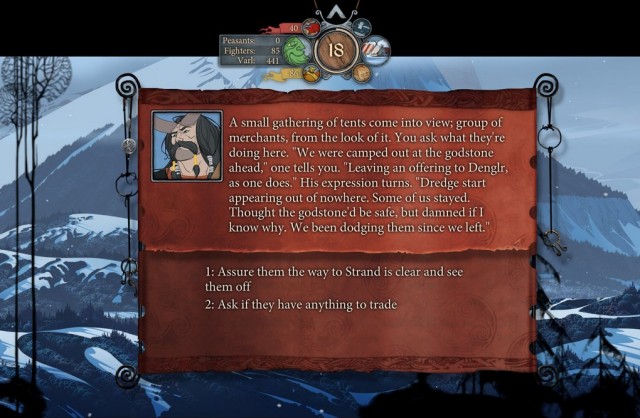
During the random encounters like this you never know if your choice will be inconsequential or if it will kill few hundred men, several named characters and cripple your progress without any warning.
For example, at one point in the game I found myself surrounded by enemy, and was given an option to either make a last stand fighting a hopeless battle against an absolutely overwhelming odds or to set up an ambush or create diversion to even the odds. The dialogs that lead up to the choice emphasized the hopelessness of fighting in the open field, and seemed to suggest a sneaky option would be the best. Unfortunately both the diversion and ambush option would result in death of one or more of your party members and huge loss of both resources as well as magic items available. Choosing the open battle on the other hand resulted with a medium difficulty encounter that could be won with just a little bit of effort and planning without actually suffering any long term losses.
This in my opinion was the weakest part of the game: a Mass Effect like mismatch between what the dialog option said, and it’s actual effect. But in Mass Effect picking the wrong dialog option did not randomly kill three or four of your party members. The Banner Saga on the other hand loves to do exactly that. I get why they do that: it creates tension, and makes your choices meaningful. It makes the player feel like a lot is at stake, and no one is ever safe… Unless of course you choose an open battle every time, because then you can actually mitigate damage and manage casualties on your own terms. I kinda wish the dialog based calamities were telegraphed more clearly. In fact, I wish losing a party member was more often made an explicit choice: a trade-off or a moral quandary, rather than an almost random event.
The combat system is simplistic, but I rather like it. I have often complained we don’t see enough of turn based tactical squad combat these days, and The Banner Saga scratches exactly that particular itch for me. The heroes you control have RPG like stat progression and can be equipped with various magic items that boost their efficiency. They all have special combat abilities that can sometimes be chained to a devastating effect (though they are all very situation dependent, and useless unless your heroes are placed just the right way on the board).
There is something to be said about making the characters hit points also being their damage output capacity. In a way it makes perfect sense, especially with a lot of Varl an hulking Dredge giants scuttling around the battlefield. It does however change the way you play and think about the encounter. In most turn based tactical games you usually want to concentrate your damage on big threats and eliminate them as soon as you can. In Banner Saga you actually want to avoid eliminating the biggest threats. Instead you want to maim them to the point they can’t effectively deal damage to your heroes anymore and then use their body as a shield for your ranged troops. Since all movement is done on a grid, and only few units have the ability to walk “over” the squares occupied by another unit, you can effectively bottleneck enemy force by specifically not killing their largest units.
The turn order is a bit unusual as well. In most games you move all your units, and then the enemy moves theirs. Here you alternate with the enemy, each moving one character at a time. This means you have much less space to plan your movement, and you always have to be aware of the initiative order anticipate the enemy moves. You can easily leave yourself open and vulnerable by simply forgetting that your archers may not be able to move out of the way before an enemy unit descends upon them.
The game is rather unique both with respect to the gameplay and especially the story. Despite the flawed “moral choice” system the plot is still pretty gripping and I am in love with the setting and the mythology of the world. I think I have literally spent a few hours just panning around the world map and reading the fluff about all the different locations. That said, I wish the game would actually mark the places I visited and plot my movements on the map because it was sometimes hard for me to find the landmarks I passed some time ago with nothing but just the current location as a reference. The best and simultaneously worst part of the game is that the story isn’t finished yet.
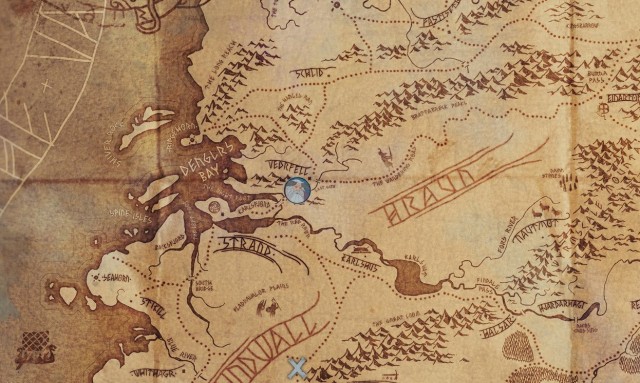
The world map is huge and full of interesting fluff. You can click on locations and read about their history. Unfortunately you never really get a sense of the places you passed because the game uses map markers very sparingly.
On one hand, I’m now eagerly awaiting the sequel, if it ever happens, because I really want to know what happens next. On the other hand, the next installment will have to innovate a bit. At the very least it will need to address the almost random way in which it kills off important combat characters without giving player enough information to make a hard choice. If you sacrifice a character you like for the greater good it generates pathos, but if said character dies to a random event it is more annoying than tragic. Combat system will have to improve a bit too. Not that it is bad right now, but it is a little bit repetitive and I’m not sure if it will carry a whole next game. Creating a separate unit/army based combat system for the large battles the story claims are happening in the background would probably do a lot to shake things up.
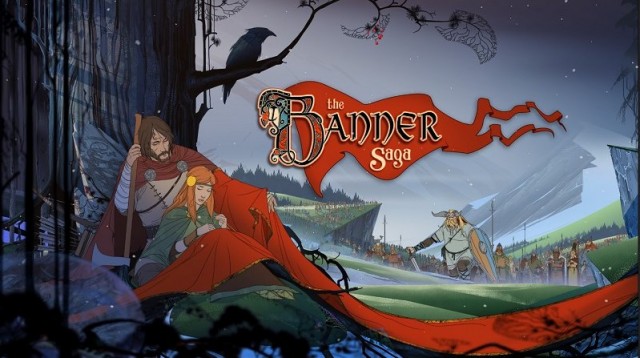
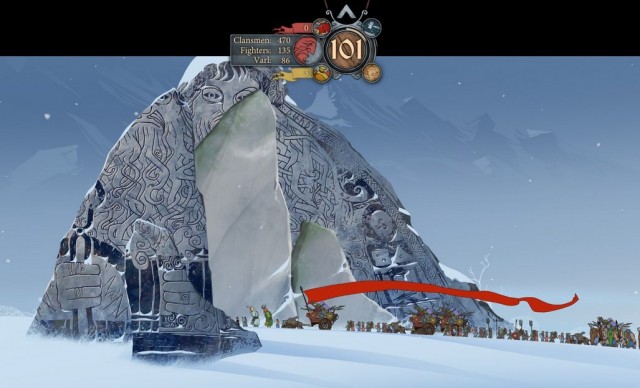
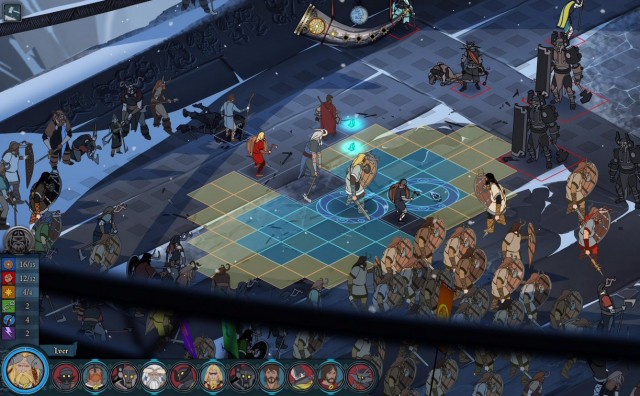
Your review almost exactly covers my feelings about the game. The atmosphere of the game and the world it creates is fascinating and was easily my favorite part of it all. In fact, my 7DRL entry, Northbound (video, about), was loosely inspired by The Banner Saga.
Other than this, though, I thought the game was too punishing. Games can be challenging, but just punishing the player for no reason doesn’t accomplish this in a fun way. Like you said, there’s no rational correlation between your choices and the consequences. Thematically it makes sense — hopelessness and inability to meaningfully affect your situation — but it makes for bad gameplay. Civ5 had an early game design mistake like this: they wanted AI diplomacy to be mysterious, hiding the AI’s logic from the player. Instead of being rich and interesting, it resulted in the AI’s behavior being indistinguishable from die rolls, only frustrating players. They eventually backed out of that game mechanic because it didn’t work.
The turn-taking combat mechanic was a major flaw, IMO. It means as you kill enemies, they speed up because each of their units gets turns faster than your units. Under some circumstances, having more units can be a liability, because the extra units are consuming turns that are better spent by stronger units. This also plays into your described strategy of keeping the enemies alive: weak enemies not only clog up the map, they slow down the strong enemies by wasting turns.
Still, like you, I’m excited to see more of this fantasy universe.
Hey Luke,
I share your enthusiasm for the lore and setting of Banner Saga. I’ve not seen or read anything like it before. Plus, the art and haunting music came together to impose this air of crushing despair on your journey in the game, and it kept me glued to my chair until I’d finished it… twice.
But I played the game in Feb, or whenever it was released, as I was a Kickstarter backer. Since then I’ve had a while to think about The Banner Saga, and I came to the conclusion that its systems don’t mesh well together. The only major criticisms I read about were the combat and the random outcomes of your choices, but I think there are some deeper, systemic problems.
For example, the same resource is used to buy supplies and upgrade your fighters. This tradeoff is contrived and ‘gamey’ the way XCOM’s decisions are, but that’s okay. The first time I played it I spent it mostly (not entirely) on food, which meant I lost more battles, gained less renown, and the final fight was pretty much impossible. It was a downward spiral.
The second time I upgraded my fighters, and had a caravan strength of zero during the final march to the coast–and this did nothing. A thinning of your numbers does not affect anything–not the narrative, not the random events, not the combat scenarios. Some of these events should be impossible with zero people in your caravan but they happen anyway. And no named NPC ever died of hunger (or even mentioned the dwindling supplies), so it does not even affect you on an emotional level. Your caravan strength is just a number on the screen that does nothing.
The game also does this annoying Bioware thing of segregating the combat bits from the marching and other narrative bits. This is my chief problem with Bioware games, and it was disheartening to see it here. At one point the chieftain’s wife was run through with a knife in a dialog ‘cutscene’, but she was available for combat a minute later. (I’ve also had the reverse happen.)
And while I liked the conflation of hit points and strength, I never could wrap my head around the alternating turn order even when the parties are completely mismatched in number.
> “What is worse, there is usually no way of telling which options are dangerous, or what their effects might be.”
I actually loved that the dialog based calamities were not foreseeable or explicit trade-offs. Maybe it’s a philosophical thing; life is pretty random and capricious, especially in times of change or disaster. This is what calamities are like. Heck, I also liked that I lost so many combat encounters and the game just continued, leaving you to lick your wounds.
I can see why someone looking to ‘game’ the game (as opposed to roleplay) might be annoyed by this. This actually takes me back to the discussion we had about Dishonored on your blog. Many people were furious that it gave you all these toys but ‘punished’ you for using them. I had some qualms about the way the chaos meter worked, but I liked it in principle. To play Dishonored purely as a power fantasy and simultaneously expect to be rewarded for psychopathy struck me as being petulant and a little arrogant.
Anyway, for a $10 pledge on Kickstarter, The Banner Saga left me very pleased and wanting more. If they can intertwine their systems to be less disjoint and expand on the lore, I think the next installment will be great stuff.
@ Chris Wellons:
Wow, good job on Northbound. Although the first thing I did was to go into the “corruption” area and was disappointed it did not kill me. Other than that, well done. :)
And yeah, I really wish they had a regular turn sequence. I feel like most of the character abilities would simply synergize better with an X-COM like turn sequence…
Then again I’ve been reading a lot about this particular argument lately, with respect of tabletop games and there are a lot of people who strongly advocate alternating sequences like this. The idea is that they minimize the amount of time any given player has to spend sitting and waiting for enemy movements. Not only that, but many games with distinct movement phases do have action-reaction elements, like for example Overwatch in X-COM or Warhammer 40k.
I still prefer the traditional turn sequence though.
@ Karthik:
Yeah, I noticed that too. I was obsessing about not losing people from my caravan up until I realized it actually meant nothing. There wasn’t any game-effect of having your numbers dwindle, and no one ever mentioned it during the narrative bits. So it was just a number going up and down with really no weight attached to it, which was kinda unfortunate. It seems that only reason you might want to use Renown to buy food is to get the “Quartermaster” Steam achievement. But that’s just meta-gaming and not a tangible in-game reason to do anything.
I totally get what they were going for with the “shit is random, because life is also random” sudden character death events. I can appreciate that from an artistic point, but most of the time it just annoyed me. Whenever I got blind-sided with an unforeseen shitty event, I would typically just re-load and pick a different dialog/choice branch.
I don’t know – I feel like this sort of thing is stripping agency from the player. I’m not opposed to game throwing you curve-balls, but I feel that it works best if it also gives you a chance to struggle and persevere and come out victorious in the end. Or at the very least to fail spectacularly on your own terms.
I think that at the end it all boils down to the implicit contract between the player and the developer which implies that in every situation there exist optimal win states. It is one thing when a game abolishes this expectation. Many roguelikes do this: for example you might find an unidentified magic potion and the easiest way to check what it is is to drink it, at which point it may turn out it actually was the The Greater Potion of Instant Death Because Fuck You. And that’s fine. I’m ok with that kind of randomness because:
a) There is usually some way to mitigate the risks, and when you die it is usually because you were impatient or because you were not paying attention. Even though the punishment is usually dealt out via a random number generator, it is ultimately your fault.
b) You go in knowing everything will be terrible forever, and the fun is in seeing how spectacularly can you fail this time
Banner saga has win states though. For each of the conversations there is usually at least one optimal option that results in no losses, no character deaths and sometimes even a favorable boost of some sort, and one terrible option that kills bunch of named characters. But there is no way for you to evaluate or mitigate the risk in any meaningful way. You are basically just playing the Monty Hall game, but if you pick the door with the goat, you actually have to take the goat home and it poops all over your furniture.
I feel that Mass Effec kinda handled this sort of thing better during the suicide mission where you could either pick “the right person for the job” or face the possibility they could die forever. At least there it felt like you were making and informed informed choice rather picking random door, hoping it is not a goat.
But yeah, I get what you’re saying.